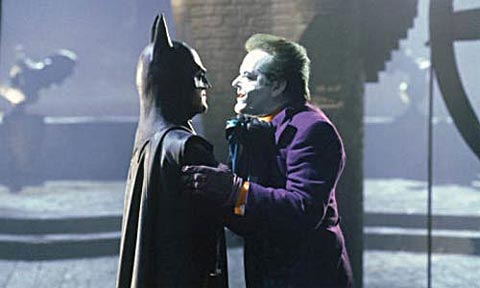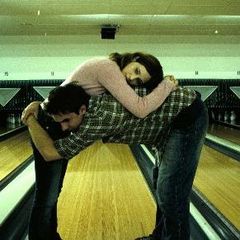
I didn't see this movie until college. I liked it. I thought it was a lot of fun. I asked for it for my birthday. I got it. I watched the excellent special features yesterday afternoon. I got excited to see the movie again. By the time the credits started rolling, I was disappointed. There's no real excuse. I first saw it when my eye for quality was developed. I had seen it several times on AMC (albeit in parts). I hadn't loved the film as a kid, so nostalgia wasn't an excuse for my mistake.
Batman is an exercise in ambition. Tim Burton and the film's producers had big plans for the movie. From the DVD interviews, it's apparent that they thought they had created something really special. The problem is that ambition is nothing without execution. Batman fails in nearly every aspect of its execution.
It's hard to criticize Jack Nicholson for going over the top with his performance. He's the Joker, for Moses' sake. There aren't any rules for playing a character like that. There should have been, though. Nicholson is clearly having the time of his life playing the role, but I must admit I had very little fun with him. He does anything he pleases and I wish a director would have reigned him more. Nicholson unleashed in any situation is cause for alarm. He's not menacing enough. And somebody tell somebody that Jack Nicholson's little jigs in character are not amusing.
That led to other problems. The screenwriters have to make scenes for Nicholson to do his thing, so they put him in that stupid museum scene. A chance to work in the Prince music ("Partyman" is the title of the song) should have been passed up. A terrible idea. Batman's entrance and exit are good. The rest is hammy junk.
Another scene suffering from failed ambition is the bell tower scene. Great plan. Bad execution. It shows sparks of quality, but crumbles under the weight of Nicholson and Basinger's goofy routines. Seriously, there's nothing less climatic than watching Nicholson ham it up as he dances on that ledge and makes his getaway.
Putting Batman into action is the best thing the filmmakers do. It's when they throw him in the mix with the Joker that things falter. And that's a lot of the time. I actually liked the action scenes for what they were, but again the Joker is more of an annoying pest than a villain. Batman should have kicked the crap out of him twenty times over.
The Bruce Wayne scenes are fairly bad as well. There is no chemistry between Michael Keaton and Kim Basinger, so their scenes together are always a bit awkward. It doesn't help that Basinger isn't a good actress. I'm not saying the role called for her to stretch her acting muscles, but any number of actresses could have added zest to the role. Keaton can play the charming billionaire well, but when he's out of costume, he left me itching for him to jump back into it. His knight in shining armor shtick at Vale's apartment is weak and laughable at best. Put the guy in that suit and let those eyes and that cool, stoic hero's voice do the work.
The sets are great. The first third of the movie is actually quite good. But I'm afraid that the corniness and levity that the filmmakers said they so wanted to avoid eventually crept in and sapped all the entertainment from Batman.
**1/2




